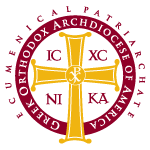Information for Non-Orthodox Guests
What to Expect
If you are familiar with the Roman Catholic Mass or some liturgically oriented Protestant traditions (e.g., Anglicans or Lutherans), many aspects of Greek Orthodox worship will be familiar to you, and much will be unfamiliar. However, if you are acquainted mostly with evangelical Protestant approaches to worship, or if you are from a non-Christian or non-religious background, our worship will likely feel like a bit of a culture shock. This is normal for your first visit to an Orthodox service! Here are some things you might want to know before your first visit.
- When you arrive for Sunday services (Divine Liturgy begins around 9:30), unless you manage to arrive before 8:30, a service will already be in progress when you arrive. This is fine. There is quite the range during which people arrive for the service.
- When you arrive, you will likely be greeted by a member of our Parish Council. They are here to welcome you and assist with answering any questions you may have.
- The first thing most parishioners do upon arriving is to visit the pangari (the counter near the back-right entrance) to purchase a candle or two, and then to venerate the icons and Gospel book near the entrance and light the candles while saying a prayer for themselves and their loved ones. These candles represent our prayers rising to heaven. You are welcome to do so if you like, but please feel neither obligation nor pressure to do so if you're more comfortable with simply observing.
- We stand for most of the service, so we recommend wearing comfortable shoes. You can follow the lead of people around you to see when to stand and when to sit.
- Speaking of what to wear, we suggest modest but nice attire, but there is no explicit dress code. Men generally wear either a jacket and tie or slacks and a long-sleeved shirt, and women will typically wear a long skirt or dress or slacks, but there is a range of formality. You can take a look at our flickr or recordings of streamed services if you're curious as to how people dress, but the most important thing is to be respectful in your dress. Our church building is a holy temple to the Living God, and it should be treated with appropriate reverence.
- Except for a few readings, the entire service is either chanted or sung. It will be a mix of English and liturgical (koine) Greek. There are service books in the pews for Liturgy (note for those who read music: the music that is printed in the green service books is not actually what we sing most Sundays), but if this is your first time to an Orthodox service, we recommend that you simply observe and absorb rather than trying to make sure you're on the right page. Service texts are also available online, and many people find it more convenient to follow along on their phones than in the printed books.
- The Divine Liturgy is a service of continuous hymns and prayers as we worship God. In many points, the choir with the congregation will be singing one hymn while the clergy are saying a different set of prayers, probably while people are moving about. This may seem a bit overwhelming at first, but keep in mind that it is not the point to pay attention to everything at all times. It is better to focus on one thing with intention as you let the experience wash over you, rather than to allow yourself to be distracted by the activity.
- Most Sundays right at the end of Liturgy we offer a short memorial service for departed loved ones. The priest will often say these prayers in front of a small table with a tray of koliva, a dish of sweetened boiled wheat (“Unless a grain of wheat falls into the earth and dies, it remains alone; but if it dies, it bears much fruit,” John 12:24) that is then distributed to the congregation following the dismissal. You are welcome to take a bag as you leave the church following the service.
- At the conclusion of the service, members of the Parish Council will pass trays to take up a collection in support of the community and its ministries while the priest makes various announcements. Naturally, we welcome any donations you may wish to offer, but please feel no obligation—we are simply glad you have joined us in our worship!
- After Liturgy, we'll head across the street to our Cultural Center for some coffee and refreshments. We invite you to join us. This is a great opportunity for you to ask questions about our community and for us to get to know each other a bit.
Most importantly, please know that you won't be judged just because you're not familiar with the service! Ask any Orthodox Christian who wasn't raised in the Church from childhood, and they'll all tell you that it takes several times attending Liturgy before you start to feel that you can follow what's going on. If you're interested in reading more, the classic article 12 Things I Wish I'd Known… First Visit to an Orthodox Church by Frederica Mathewes-Green may be helpful. But, Orthodox Christianity is fundamentally experiential, and there is nothing that can substitute for being present for the worship.

